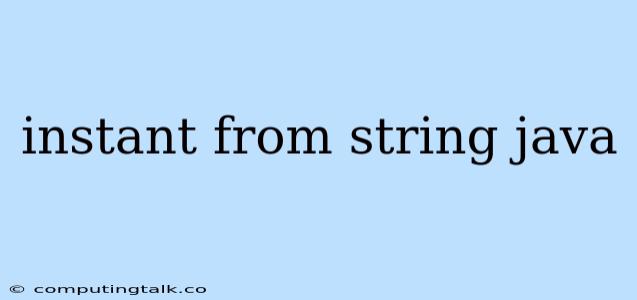Java provides a powerful and flexible way to handle dates and times, but sometimes you need to work with dates in a quick and efficient manner, especially when dealing with strings representing dates. This is where the concept of instant from string java comes into play.
Understanding Instant
In Java, the Instant class represents a point in time on the timeline, measured in nanoseconds. It's the building block for dealing with dates and times in a precise and unambiguous manner. The Instant class is part of the java.time package introduced in Java 8, which is a significant improvement over the older java.util.Date and java.util.Calendar classes.
Creating an Instant from a String
The most straightforward way to create an Instant object from a string is using the Instant.parse() method. This method expects a string representing the date and time in a specific format, known as the ISO 8601 standard format.
Example:
import java.time.Instant;
public class InstantFromString {
public static void main(String[] args) {
String dateString = "2023-10-26T14:30:00Z";
Instant instant = Instant.parse(dateString);
System.out.println(instant);
}
}
This code snippet will print:
2023-10-26T14:30:00Z
Customizing the Format
If your date string doesn't conform to the ISO 8601 format, you can use the DateTimeFormatter class to define a custom format.
Example:
import java.time.Instant;
import java.time.format.DateTimeFormatter;
public class InstantFromStringCustom {
public static void main(String[] args) {
String dateString = "2023/10/26 14:30:00";
DateTimeFormatter formatter = DateTimeFormatter.ofPattern("yyyy/MM/dd HH:mm:ss");
Instant instant = Instant.from(formatter.parse(dateString));
System.out.println(instant);
}
}
This code snippet will print:
2023-10-26T14:30:00Z
Common Pitfalls
- Timezone Awareness: When converting a string to
Instant, be mindful of time zones. TheInstantclass is timezone-agnostic, so it assumes UTC (Coordinated Universal Time) by default. If your date string has a different timezone, you need to explicitly handle it. - Formatting Errors: Ensure the format of your string matches the pattern used in
DateTimeFormatteror the ISO 8601 standard. Any discrepancy can lead to parsing errors.
Advantages of using Instant
- Precision:
Instantrepresents a point in time with nanosecond accuracy, making it suitable for scenarios demanding precise time calculations. - Immutability:
Instantobjects are immutable, guaranteeing that their values won't change unexpectedly. - Thread Safety: Immutability makes
Instantobjects thread-safe, eliminating the need for synchronization in multi-threaded environments.
Key Considerations
- Time Zone Handling: Pay close attention to time zones, especially when working with dates from different locations.
- Error Handling: Implement appropriate error handling mechanisms for situations where the parsing process might fail.
Conclusion
Converting strings to Instant objects in Java is essential for handling dates and times efficiently. Understanding the Instant class, the ISO 8601 format, and the DateTimeFormatter class allows you to create Instant objects from strings in a flexible and reliable way. By considering time zones and implementing proper error handling, you can ensure accurate and robust date and time operations in your Java applications.
